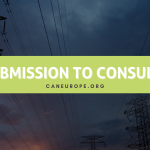Progress in the Long Term Strategy for 2050 and at the climate conference in Katowice will be for nothing if European ministers allow disputes over the size of the next EU budget to roadblock important moves towards funding a zero-emissions energy transformation, write Raphael Hanoteaux and Markus Trilling.
Raphael Hanoteaux is the EU Policy Officer with CEE Bankwatch Network, and Markus Trilling is the Finance and Subsidies Policy Coordinator for Climate Action Network (CAN) Europe.
Originally published by EURACTIV on 29 November 2018.
On Wednesday 28 November, the European Commission published its Long Term Strategy for 2050, in which it outlines various scenarios that the EU can follow in order to tackle the challenges of climate change by the middle of the century. Its most ambitious scenario calls for Europe to become ‘net-zero by 2050’, a workable model that must be adhered to if the continent is to avoid the projected costs of inaction that the Intergovernmental Panel on Climate Change has warned against.
Days after the release of the Long Term Strategy, the United Nations’ Framework Convention on Climate Change kicks off its annual Conference of the Parties in Katowice. The fact that this global meeting will be held in coal-heavy Poland epitomises the challenges Europe faces in moving away from fossil fuels while at the same time ensuring a just transition for the regions that have historically depended on extracting and burning coal for their livelihoods.
Between these two landmark events, European ministers gather in Brussels for important discussions about how the future €1.2 trillion EU budget after 2020 should be spent. Against this backdrop of the climate imperative however, Friday’s General Affairs Council still might miss the opportunity to set the appropriate parameters for the EU budget to ensure that Europe’s climate ambitions can be achieved and that the communities on the front lines of the energy transformation are not left behind.
To date discussions about the Multiannual Financial Framework have focused on the acrimonious question of what amount of resources so-called ‘net payers’ in the richer Member States should contribute to the pot, with many recipient countries of EU funding –primarily in central and eastern Europe – having dug their heels in against cuts of any kind.
Such a stumbling block is misfortunate, however, as the squabble over the size of the Budget masks a more pressing conversation about the political will among Member States to get spending plans right.
Nowhere is the need greater for effective and focused spending than in central and eastern Europe, whose economies are on the whole more carbon-intensive than in the rest of Europe. Yet Parliamentarians from these same countries continue to push for funding of fossil gas as an eligible form of green funding. While the Commission initially proposed to exclude fossil fuels from the EU Budget, representatives from central and eastern Europe have shot this down.
True energy security comes from energy savings and renewables, and the EU budget, in particular the Cohesion Policy, is designed precisely to deliver on the bloc’s green energy ambitions.
In spite of the tools offered by Cohesion Policy, Parliamentarians are pushing for ‘flexibility’ in their spending plans which they argue is necessary to avoid ceding sovereignty to Brussels. This is coupled with a push to dilute the ‘thematic concentrations’ for the ‘greener and low-carbon Europe’ objective, which calls for support for energy savings, renewable energy, and the move towards a circular economy.
Without the explicit exclusion of fossil fuels and such thematic concentrations in place however, the historical trend of funding unsustainable forms of energy generation and transportation, like fossil gas infrastructure or motorways, will continue and jeopardise any Long Term Strategy and outcomes from Katowice.
COP will no doubt focus on how to fund a just transition, where all actors who believe in fair regional redevelopment – unions, industry and local businesses, public administration, governments and civil society – can come together to find solutions to life beyond coal, like creating good quality jobs and identifying sustainable energy alternatives.
Admirably some Member States in central and eastern Europe, like Hungary and Slovakia, have signaled intentions to move away from coal. Cohesion Policy can aid in this process, by aligning EU funds with projects supporting the 2030 climate and energy targets and decarbonisation pathways. In addition, national energy and climate plans, which Member States are currently formulating, could be a one-stop-shop to pick and choose projects that meet EU targets.
The best way to ensure that the Budget delivers is through transparent and inclusive decision-making with all actors concerned. Respect for the ‘partnership principle’ is enshrined in EU legislation, meaning a bottom up approach is a must for formulating spending plans, with information routinely provided and local actors with knowledge of local realities on the ground included these conversation. Such an approach is the most cost-effective solution for ensuring win-win scenarios for Europe’s citizens and the climate.
The General Affairs Council must move between the infighting over a pittance of euros and instead focus on what is important for future generations of Europeans. Cohesion policy can fund the EU’s climate priorities, provided the opportunities presented during this important week are seized.


